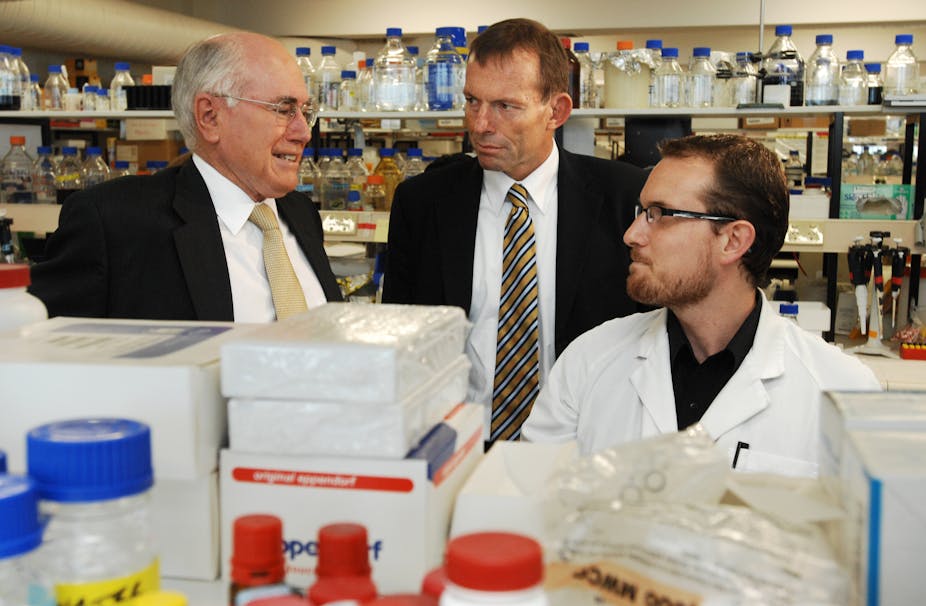The Coalition’s Policy to Protect and Streamline Health and Medical Research Funding is one of the first documents off the blocks this election. Short and sweet, it is designed to appeal to medical researchers and to the broader community.
Implicit in the message is the familiar insinuation that current practice is bureaucratic and wasteful and in need of streamlining. But there are more interesting echoes in there as well.
A strong history
One of the main messages is that under the last Coalition government, medical research benefited from strong investment and Tony Abbott was an influential health minister who prided himself on an almost visionary commitment to funding high-tech research.
It was a good time to be a researcher. Across the world, medical research investment was booming. With John Howard’s support Abbott built on the 1998 Health and Medical Research Strategic Review and pumped in resources.
And it was the right approach – investment in medical research is good for individuals and good for the economy. It was no surprise that when Abbott delivered his budget response speech this year, he began by celebrating Australia’s proud history of medical research.
Then, in Kevin Rudd’s previous government, health-care delivery displaced medical research and the research agenda turned to science rather than medicine under another effective minister, Kim Carr. Most recently, a bipartisan obsession with the budget deficit has delivered a series of research cuts and threats of cuts.
Each time cuts are foreshadowed there is debate and angst and in itself this is wasteful. Researchers recall Barry Jones’ stinging rebuke about scientists being political wimps. So now we mobilise.
A while back, Professor Doug Hilton of the Walter and Eliza Hall Institute pioneered the Discoveries Need Dollars initiative and headed off what would have been damaging cuts. His campaign prevailed and we are all grateful.
Changing the grant process
As well as the waste involved in constantly defending budgets, another type of waste has crept in. It’s no one’s fault really. In an effort to be fair, the fund allocation or granting process has become so elaborate that it is sapping our strength.
Some interesting work by Adrian Barnett, Danielle Herbert and Nicholas Graves has exposed how much time (550 years for NHMRC Project Grants in 2012) and money (AUD$66 million in salary costs alone) is spent on the granting process. If you’re a researcher, you can contribute your own experiences via their survey here.
The 2011 Strategic Review of Health and Medical Research (McKeon Review) also pinpointed this problem. The Coalition policy focusses on this issue and suggests:
- aligning the National Health and Medical Research Council (NHMRC) and Australian Research Council (ARC) grant systems;
- introducing a triage to cut out non-competitive applications; and
- transitioning to five-year, rather than three-year grants.
The 2011 Nobel laureate Brian Schmidt has independently called for five-year ARC grants.
I fully support these aims but would warn that, at present, there are relatively few grants not deserving funding. There are grants from new researchers who are perhaps not quite ready but, during my career, I’ve seen very few dud applications. I expect the saving from the cull will be small.
There are other savings that can be made. A “just-in-time” system can be introduced so that only the fifth or so of grant applicants who are funded have to provide budgets and other details. That would save a lot of people from needless and painstaking tasks.
We could also do away with the repetitive summaries, synopsis and team record statements that arose as it became clear that whole grant applications were so long that they needed summarising.
We should also consider what value external assessors and rebuttals to these assessments provide.
Becoming strategic
Most importantly, the policy implicitly embraces the McKeon Review. The Review recommended that rather than ad hoc start-stop funding, we adopt a strategic approach where a set proportion of health spending is dedicated to research for the future. This would be a huge step forward for Australia.
The main controversial thing about the policy is that by fixating on medical research, it tends to imply that other research is less valuable. Obviously, knowledge covers the spectrum like a rainbow, and it’s impossible to tell where medical research ends and other disciplines begin.
In my own work in molecular biology I use microscopes, centrifuges, and sequencing machines. Every day, I am grateful to mathematicians, physicists, engineers and others whose work has made my medical research possible.
I’m not sure how much further we’ll get if these people are sent to the back of the funding queue. All research, not just demonstrably applicable medical research, should be considered.
The Coalition policy is a start and what we need now is a strategy to provide stable funding, not just for medicine, but for all Australian research.

